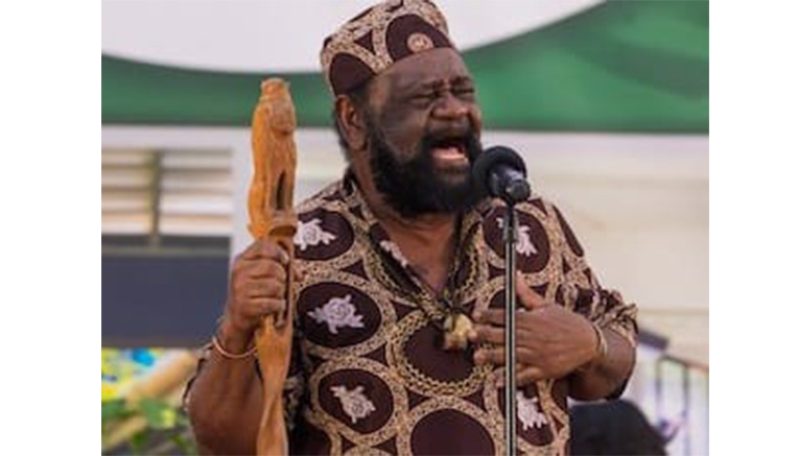Yoruba Singers celebrate 54 years of music, culture, and change
FOR more than half a century, the music of the Yoruba Singers has been a soundtrack to the Guyanese experience—bold, spirited, and deeply rooted in culture. This year, as the legendary group celebrates 54 years of continuous performance and evolution, lead vocalist Eze Rockcliffe says it feels like just the next chapter in a journey marked by commitment, adaptability, and love for country. In an interview with Pepperpot Magazine, Rockcliffe shared how the Yoruba Singers managed to remain relevant, discussed some of their challenges along the way, and outlined the direction they would like to see Guyanese folk music take.
Celebrating the group’s anniversary last week, Rockcliffe, in a reflective sit-down with this magazine, shared, “I feel that I’ve served my nation very well. And I want to continue to do that, given the various opportunities that are available. I’ll be willing to serve my nation,” he stated. It’s a humble statement from someone who, along with the rest of the Yoruba Singers, has performed on some of the world’s most renowned stages, from Madison Square Garden in New York to Carifesta events across the Caribbean.
One of the reasons the Yoruba Singers are as well-known as they are is because they were among the first musicians to put the name of Guyana on the map. Recounting a few of his career highlights, Rockcliffe shared, “Well, one of the main highlights was Madison Square Garden in New York City in 1983 and ’84 for the Mother’s Day concert,” he said. “That event brought together many well-known artistes from across the Caribbean. Then there was Carifesta Cuba, R&R Festival in ’81, Jamaica Carifesta in 1976, Carifesta Barbados in 1981. We’ve also performed in Brazil, Trinidad and Tobago at the Napa River Bowl, and countless times in Suriname,” he stated. For the group, each performance on an international stage represented more than just a performance; they were proof that Guyanese folk and fusion music had a place on the international scene.
The Yoruba Singers are no strangers to adversity. Like many long-standing music groups, they’ve seen their share of members come and go. “In 1990, seven persons walked out of the band at one time,” he recalled. And whereas most bands would take time to regroup, the Yoruba Singers pushed on, continuing with a show that very same week. “That happened on a Monday. But by Saturday, we played the Jazzy Band. We never stopped functioning. Some of them even passed through again a few years later,” Rockcliffe stated.
Part of what has kept the Yoruba Singers going for 54 years is their ability to adapt without compromising their roots. After returning home from Jamaica in 1976, the band attempted to fully lean into their original compositions, but promoters at the time were not on board and left the band to their own devices. “When we came back from Jamaica in 1976, we were so popular at the festival, playing our own music. We got overwhelmed. When we came home, we decided for at least three months, every day we would just play our music only. And the promoters at the time turned their back on us. So what we had, we decided we were going to play everything, every genre that exists. Whether funk, soul, calypso, soca, reggae, and even some Latin American music,” Rockcliffe shared.
This shift was not just a means of survival for the group; it also marked a shift in the band, diversifying their catalogue and giving new meaning to what they meant as a band. This is why today the Yoruba Singers are among the most versatile groups Guyana has to offer. As Rockcliffe explained, “And that is why we survived with that for so long. Because if you call us for a wedding, we can play. If you call us for a festival, we can play. If you call us for a reggae concert, we can play. If you call us for a soca event, we can play. And that is the secret of staying long. That is the secret. Adapt,” Rockcliffe stated.
At a time when modern genres are rising fast, the question of how Guyana preserves and develops its cultural and folk music remains vital. Rockcliffe believes the answer lies in collaboration and creating space for musicians to have a voice in the role that music plays in national identity. “There must be dialogue. We must set up a think tank to tackle the cultural woes of our country. Especially now that we have our money, we can point culture in a direction that is financially beneficial to us. But it takes dialogue. It takes brainstorming,” Rockcliffe stated. Still, he remains optimistic, encouraged by the fresh wave of talented Guyanese artistes, people like Samuel Medas, who’s making a name on the gospel circuit, and a growing reggae scene bubbling with potential.
As for young musicians finding their place in the industry, Rockcliffe’s advice is as straightforward as it is powerful: work hard and show up. As he stated, “Work hard at your craft, take it seriously, and be dependable. If you’re in an organisation, and you have to reach to perform at five o’clock, be there at five. If you have to go to rehearsal twice a week, be at your rehearsals.” Rockcliffe further added, “Try your utmost to be dependable in your musical organisation or your musical career. If you take a month in advance to perform tonight, show up. Show up.”
Fifty-four years is a remarkable milestone for any musical group, especially one that continues to evolve while staying true to its cultural roots. The Yoruba Singers are more than just musicians; they are cultural ambassadors, storytellers, and keepers of a sound that is uniquely Guyanese.





.jpg)








